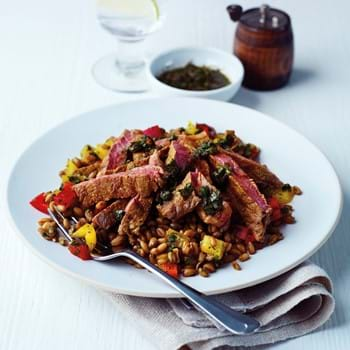
Nutrition
Healthcare professionals talk about the importance of a varied and balanced diet, but what does this actually mean?
A balanced diet is not focussed on single nutrients or foods - no single food contains all the essential nutrients the body needs to stay healthy and work properly. Our diets should contain a variety of different foods, to help us get the wide range of nutrients that our bodies need, including foods from the main food groups.
A healthy dietary pattern includes:
• plenty of plant-based foods such as wholegrains, vegetables and fruit
• a variety of protein foods such as seafood, lean red meat* and poultry, eggs, pulses (beans, pea and lentils) nuts, and seeds
• some low-fat dairy products (or dairy alternatives)
• some unsaturated fat
• lower intakes of fatty/processed meats, refined grains, sugar-sweetened foods and drinks
• lower salt and lower saturated fat intakes
As well as healthy, balanced diets, we also need to think about lifestyle including regular physical activity. A healthy dietary pattern and lifestyle is linked with a reduction in the risk of diseases like cardiovascular (heart) disease, type 2 diabetes and some cancers.
*The current UK Government advice is that people who are high consumers of red and processed meat, in other words who eat more than 90g (cooked weight) per day, cut down to 70g (this equates to approximately 500g a week), as high intakes are associated with an increased risk of colorectal (bowel) cancer.
Fascinating nutrition facts
Beef and lamb can taste great but did you know it’s naturally rich in protein and is a source of other essential nutrients such as zinc, potassium and B vitamins?
Beef and lamb can be part of a healthy, balanced diet.
Beef and lamb nutrition
Beef is a rich source of protein and provides eight essential vitamins and minerals (niacin, vitamins B6 and B12, riboflavin, plus iron, zinc, potassium and phosphorus) that support health related wellbeing.
Lamb is also a rich source of protein and provides seven essential vitamins and minerals (niacin, vitamins B6 and B12 and zinc and a source of potassium, phosphorus and pantothenic acid) that support health related wellbeing.
All nutrition and health claims included are authorised claims that comply with Regulation (EC) No 1924/2006.
These nutrients carry out a range of different functions in our bodies. Check out some of the important functions these nutrients help do and how beef and lamb, as part of a healthy, balanced diet, can contribute to our intake of these:
Beef Nutrition
Beef is naturally rich in protein.
Protein contributes to the maintenance and growth in muscle mass, and to the maintenance of normal bones.
On average, beef contributes to 6% of protein intakes in adults, and 8% in older adults in the UK.
Protein in the diet
Protein is essential for growth and repair of the body and maintenance of good health so we need to include some protein foods in our diet. As well as beef, lamb and pork other food sources of protein include beans, pulses, fish, poultry, eggs, nuts and seeds.
Making healthier choices can help you eat meat as part of a healthy, balanced diet. For example when buying meat, go for the leanest option – you can ask your butcher or check the nutrition label, and when cooking meat choose healthier methods like grilling, rather than frying in lots of oil or fat
Pulses, such as beans, peas and lentils, can be particularly important for people who don’t eat animal products but they are also a healthy choice for meat eaters and are a good source of fibre. They can be added to pasta sauces, stews, soups and curries.
We should aim to eat at least 2 portions of fish every week, 1 of which should be oily, such as salmon or mackerel.
Beef is a source of iron.
Iron can help:
• the immune system to work normally;
• reduce tiredness and fatigue;
• the formation of red blood cells.
On average, beef contributes 5% of iron intakes in UK adults.
Iron in the diet
As well as beef, other food sources of iron include green leafy vegetables, fortified breakfast cereals, wholegrains, eggs, nuts and seeds.
The iron found in meat (haem iron) is better absorbed by the body than the iron found in plant based foods (non-haem iron). However, vitamin C from vegetables and fruit can help the body absorb iron from non-meat sources, so it is a good idea to include plenty of fruit and vegetables with meals.
Beef is source of the following B vitamins:
• Riboflavin (vitamin B2)
• Niacin (vitamin B3)
• Vitamin B6
• Vitamin B12
These B vitamins can help:
• with normal energy production in the body;
• the nervous system to work normally;
• reduce tiredness and fatigue.
On average, in UK adults beef contributes to 3% of riboflavin and 7% of niacin intakes, 5% of vitamin B6, 10% of vitamin B12.
A word on vitamin B12
Typically, vitamin B12 is only found naturally in foods from animal sources, including meat, fish, dairy foods and eggs. Vegan sources include:
• Vitamin B12 fortified yeast extract
• Vitamin B12 fortified breakfast cereals
• Vitamin B12 fortified dairy-free alternatives
• Vitamin B12 supplements
Beef is a rich source of zinc.
Zinc can help:
• with normal cognitive function;
• the maintenance of normal hair, skin and nails;
• the immune system to work normally;
• with normal fertility and reproduction.
On average beef contributes to 10% of zinc intakes in UK adults.
Zinc in the diet
As well as beef, other sources of zinc include lamb and pork, wholegrains, some cheeses, shellfish, nuts and seeds.
Beef is a source of potassium.
Potassium helps support normal blood pressure, and helps the nervous system to work normally.
On average beef contributes 4% of potassium intakes in UK adults.
Potassium in the diet
As well as beef, other sources of potassium include lamb and pork, fish, beans, potatoes, bananas, some green vegetables like broccoli and spinach, and nuts and seeds.
Beef is a source of phosphorus.
Phosphorus helps the maintenance of normal bones and teeth. It also helps normal energy production in the body.
Phosphorus in the diet
As well as beef, other sources of phosphorus include lamb and pork, eggs, dairy foods, fish and shellfish, brown rice and oats, nuts and seeds.
Lamb Nutrition
Lamb is naturally rich in protein.
Protein contributes to the maintenance and growth in muscle mass, and to the maintenance of normal bones.
On average lamb contributes to 2% of protein intakes in UK adults.
Protein in the diet
Protein is essential for growth and repair of the body and maintenance of good health so we need to include some protein foods in our diet. As well as beef, lamb and pork other food sources of protein include beans, pulses, fish, poultry, eggs, nuts and seeds.
Making healthier choices can help you eat meat as part of a healthy, balanced diet. For example when buying meat, go for the leanest option – you can ask your butcher or check the nutrition label, and when cooking meat choose healthier methods like grilling, rather than frying in lots of oil or fat.
Pulses, such as beans, peas and lentils, can be particularly important for people who don’t eat animal products but they are also a healthy choice for meat eaters and are a good source of fibre. They can be added to pasta sauces, stews, soups and curries.
We should aim to eat at least 2 portions of fish every week, 1 of which should be oily, such as salmon or mackerel.
Lamb is a source of niacin (vitamin B3), pantothenic acid (vitamin B5), vitamin B6, and vitamin B12.
These B vitamins can help:
• with normal energy production in the body;
• the nervous system to work normally;
• reduce tiredness and fatigue.
On average, lamb contributes to 2% of niacin (vitamin B3), 1% of vitamin B6 and 3% of vitamin B12 intakes in UK adults.
A word on vitamin B12
Typically, vitamin B12 is only found naturally in foods from animal sources, including meat, fish, dairy foods and eggs. Vegan sources include:
• Vitamin B12 fortified yeast extract
• Vitamin B12 fortified breakfast cereals
• Vitamin B12 fortified dairy-free alternatives
• Vitamin B12 supplements
Lamb is a rich source of zinc.
Zinc can help:
• with normal cognitive function;
• the maintenance of normal hair, skin and nails;
• the immune system to work normally;
• with normal fertility and reproduction.
On average, lamb contributes to 3% of zinc intakes in UK adults.
Zinc in the diet
As well as lamb, other sources of zinc include beef and pork, wholegrains, some cheeses, shellfish, nuts and seeds.
Lamb is a source of potassium.
Potassium helps support normal blood pressure, and helps the nervous system to work normally.
On average, lamb contributes to 1% of potassium intakes in UK adults.
Potassium in the diet
As well as lamb, other sources of potassium include beef and pork, fish, beans, potatoes, bananas, some green vegetables like broccoli and spinach, and nuts and seeds.
Lamb is a source of phosphorus.
Phosphorus helps the maintenance of normal bones, and is needed for the normal growth and development of children’s bones. It also helps normal energy production in the body.
Phosphorus in the diet
As well as lamb, other sources of phosphorus include beef and pork, eggs, dairy foods, fish and shellfish, brown rice and oats, nuts and seeds
Lamb is a source of pantothenic acid (vitamin B5).
Pantothenic acid can help:
• normal energy production in the body;
• normal mental function;
• reduce tiredness and fatigue.
Pantothenic acid in the diet
A wide variety of plant and animal foods contain pantothenic acid, and this is probably why this isn’t a nutrient of concern in the UK.
Nutrition through the life Stages
Our nutrient requirements vary at different stages of our lives. But by eating a variety of foods within a healthy, balanced diet most of us should be able to get the nutrients we need to meet these requirements, although there may be some specific life stages when we need a supplement (e.g. folic acid in early pregnancy).
Lean red meat can be part of a healthy, balanced diet, and can help contribute to some nutrient intakes for example iron and zinc from childhood to older years.
Find out more about different life stages below.

 Body Area
Body Area
 Nutrient
Nutrient
 What it does
What it does
Children grow quickly and are generally, naturally active. To meet the extra demands of growth children have higher energy and nutrient requirements for their body size compared to adults. They need a healthy, balanced diet that provides adequate energy and nutrients to meet their requirements. This includes protein, iron, zinc, vitamins B6 and B12, niacin, riboflavin, phosphorus and potassium. Phosphorus for example is needed for the normal growth and development of bone in children.
About 1 in 10 children (aged 4-10 years) have low intakes of zinc. Beef is a good source of zinc, and can be included as part of a healthy, balanced diet. Other sources of zinc include lamb and pork, shellfish, cheese and wholemeal bread.
Did you know…
1 in 5 children in reception (aged 4-5 years) are overweight or obese which rises to 1 in 3 in year 6 (aged 10-11 years). This can affect their physical and mental health, and can also impact on their performance at school. It’s important children are given the opportunity to develop an understanding of healthier food choices and learn where food comes from, and are encouraged to develop cooking skills, whenever possible.
The Food-a-fact-of-life website has lots of ideas on how to help children learn to cook, resources on where food comes from, and age-appropriate recipes they can do at home: https://www.foodafactoflife.org.uk/
Recipes for dinners
You may like to try these tasty recipes that your kids can help make:
Beef
• Beef Mini Roast with Lemon, Garlic and Honey (Kid's version)
https://www.simplybeefandlamb.co.uk/recipes/beef-mini-roast-with-lemon-garlic-and-honey-kids-version/
• BBQ Beef, Mushroom and Redcurrant Burgers
https://www.simplybeefandlamb.co.uk/recipes/bbq-beef-mushroom-and-redcurrant-burgers/
Lamb
• BBQ Lamb, Mushroom and Redcurrant Burgers
https://www.simplybeefandlamb.co.uk/recipes/bbq-beef-mushroom-and-redcurrant-burgers/
• Lamb Mini Roast with Mango Chutney (Kid's version)
https://www.simplybeefandlamb.co.uk/recipes/lamb-mini-roast-with-mango-chutney-kids-version/
 Body Area
Body Area
 Nutrient
Nutrient
 What it does
What it does
During the teenage years many changes occur, including physical, mental and social changes. Eating a healthy, varied diet is essential to ensure that they get the energy and nutrients they need to help them grow and develop normally. Eating well may also help in dealing with times of stress, for example exams or moving schools, as well as help to develop healthy eating and lifestyle habits that will hopefully last for life.
Studies show that diets of teenagers are not as great as they could be and certain nutrient intakes are below recommended amounts. For example, almost 50% of teenage girls do not get enough iron in their diet, and they may be at increased risk of iron deficiency anaemia. Amongst other functions, iron contributes to normal cognitive development of children.
Sources of iron include:
• Lean red meat;
• Wholegrains (e.g. wholemeal bread);
• Iron-fortified breakfast cereals;
• Dark green vegetables (e.g. kale, watercress);
• Beans (e.g. red kidney beans, chickpeas);
• Dried fruits (e.g. figs, raisins) and seeds (e.g. sesame seeds, pumpkin seeds).
Teenagers may become more conscious of their body size, including muscle mass and appearance like hair and skin, and the effect of what they eat on these. Protein supplementation has become increasingly popular for muscle building. Although protein is essential for the maintenance and growth of muscles supplements (like protein shakes, bars and powders) are generally unnecessary. For most teenagers the body’s protein needs can easily be achieved from a healthy, varied diet, with good choices of protein foods like lean red meat, poultry, fish, eggs, milk and yogurt and soy (e.g. tofu, soya beans).
Did you know…
Certain nutrients like zinc can influence the condition of our hair and skin. Zinc helps to maintain normal hair, skin and nails. Good sources of zinc include beef, lamb and pork, shellfish, cheese and wholemeal bread.
For more on nutrition for teenagers go to BNF’s website: https://www.nutrition.org.uk/healthyliving/lifestages/teenagers.html
Recipes
Change4life website has lots of tasty recipes that are quick and easy to prepare that teenagers can enjoy with friends or family: https://www.nhs.uk/change4life/recipes/dinner#all-dinner-recipes
Some other recipes include:
Beef or lamb
• Mini Meaty Pizzas
https://www.simplybeefandlamb.co.uk/recipes/mini-meaty-pizzas/
• Beef or lamb and Red Pepper Burgers
https://www.simplybeefandlamb.co.uk/recipes/beef-and-red-pepper-burgers/
 Body Area
Body Area
 Nutrient
Nutrient
 What it does
What it does
Diet-related health concerns that may be common in adulthood are cardiovascular (heart) disease, overweight and obesity and type 2 diabetes. On average, adults consume too much free sugars, saturated fat and salt, and not enough fibre.
Consuming too much saturated fat can increase the cholesterol levels in the blood, which over time can lead to heart disease. To help reduce your saturated fat intakes try to choose lean cuts of meat, remove any visible fat, drain away any fat from minced meat, use healthier cooking methods such as grilling rather than frying, and add small amounts of unsaturated oil (e.g. vegetable oil) when cooking.
To help increase fibre intakes you could add extra vegetables and pulses to meat dishes, like pasta sauces, curries, stews, and soups.
The best way to maintain a healthy weight is to eat a healthy, balanced diet and be physically active.
Did you know…
About 1 in 5 adults in the UK have low levels of vitamin D. We get most of our vitamin D from the action of sunlight in the summer months on our skin, and only a few foods like oily fish and eggs are a good source of vitamin D. But red meat including beef, lamb and pork are useful contributors of vitamin D to our diet, contributing around 10% of vitamin D intakes in UK adults.
Recipes
These recipes include vegetables and/or pulses so can contribute to fibre intakes, and are lower in saturated fat.
Beef
• Griddled Beef with Crispy Broccoli and Chick Peas
https://www.simplybeefandlamb.co.uk/recipes/griddled-beef-with-crispy-broccoli-and-chick-peas/
• Piri Piri Beef and Bean Salad
https://www.simplybeefandlamb.co.uk/recipes/piri-piri-beef-and-bean-salad/
Lamb
• Lamb, Chick Pea and Cherry Salad
https://www.simplybeefandlamb.co.uk/recipes/lamb-chick-pea-and-cherry-salad/
• Teriyaki Lamb Stir Fry
https://www.simplybeefandlamb.co.uk/recipes/teriyaki-lamb-stir-fry-easy/
 Body Area
Body Area
 Nutrient
Nutrient
 What it does
What it does
‘Older adults’ covers a large age span including the younger old in their 60s to the oldest old, those over 85, who are at higher risk of frailty and malnutrition.
Certain changes in the body occur during the ageing process. For example, body fat can increase and muscle mass decreases. Ensuring the diet provides adequate amounts of protein, as part of a healthy, balanced diet, along with regular physical activity is important to maintain muscles. Good choices of protein foods include lean red meat, poultry, fish, eggs, milk and yogurt and soy (e.g. tofu, soya beans).
Sense of taste and smell can also alter in ageing, which can affect someone’s appetite and how much they like food, so making sure foods are flavoured well using herbs and spices (rather than salt) can be important. Other changes such as a deterioration in dental health may mean a more limited intake of food if chewing becomes difficult, and softer foods like soups, potato-topped pies using minced meat like shepherds or cottage pie and slow cooked stews, maybe easier to eat. Making foods as tempting and tasty as possible will help keep meals enjoyable.
It’s also important to keep the brain active. Some nutrients in beef are involved in supporting brain function. B vitamins, iron and zinc help normal psychological function.
Beef
Nourishing soups:
• Spiced Beef Pumpkin and Carrot Soup
https://www.simplybeefandlamb.co.uk/recipes/spiced-beef-pumpkin-and-carrot-soup/
• Meat Feast Soup with Couscous
https://www.simplybeefandlamb.co.uk/recipes/meat-feast-soup-with-couscous/
Stews:
• Hearty European Beef Stew
https://www.simplybeefandlamb.co.uk/recipes/hearty-european-beef-stew/
• Beef Ale and Turnip Stew with Bubble and Squeak Cakes
https://www.simplybeefandlamb.co.uk/recipes/beef-ale-and-turnip-stew-with-bubble-and-squeak-cakes/
Lamb
Nourishing soups:
• Lamb and Lentil Soup
https://www.simplybeefandlamb.co.uk/recipes/lamb-and-lentil-soup/
• Spring Lamb Meatball Broth with Vegetables
https://www.simplybeefandlamb.co.uk/recipes/spring-lamb-meatball-broth-with-vegetables/
Stews:
• Spring Lamb Stew
https://www.simplybeefandlamb.co.uk/recipes/spring-lamb-stew/
• Citrus Lamb Stew with Saffron and Figs
https://www.simplybeefandlamb.co.uk/recipes/citrus-lamb-stew-with-saffron-and-figs/
 Body Area
Body Area
 Nutrient
Nutrient
 What it does
What it does

Pregnancy
A healthy, balanced diet rich in nutrients, is important for both the mother and the baby. The basic principles of a healthy, balanced diet during pregnancy are similar to those recommended for the general population.
Find out more below.
 Body Area
Body Area
 Nutrient
Nutrient
 What it does
What it does
Did you know…
Iron is important to support fetal growth and development. But some women don’t get enough iron in their diet and are at risk of iron deficiency anaemia. So throughout pregnancy, women are advised to eat plenty of foods that are sources of iron like lean red meat, green leafy vegetables, and legumes.
There are some foods and drinks that pregnant women should avoid or that they should limit as there’s a small risk they may make them ill and/or harm the baby. Some relate to meat such as avoiding all types of pate, liver and liver products and raw or undercooked meat, including cured meat, but thoroughly cooked meats, cold cooked meats and prepacked meats like ham are fine for pregnant women to eat.
For more information on nutrition during pregnancy go to BNF’s website: https://www.nutrition.org.uk/healthyliving/nutritionforpregnancy.html
Recipes
These recipes contain foods that are providers of iron like broccoli and spinach.
Beef
• Aromatic Beef with Orange and Apricots
https://www.simplybeefandlamb.co.uk/recipes/aromatic-beef-with-orange-and-apricots/
• Beef with Broad Bean and Spinach Salad
https://www.simplybeefandlamb.co.uk/recipes/beef-with-broad-bean-and-spinach-salad/
Lamb
• Lamb and Broccoli Bake
https://www.simplybeefandlamb.co.uk/recipes/lamb-and-broccoli-bake/
• Minced Lamb Tagine
https://www.simplybeefandlamb.co.uk/recipes/minced-lamb-tagine-quick/






